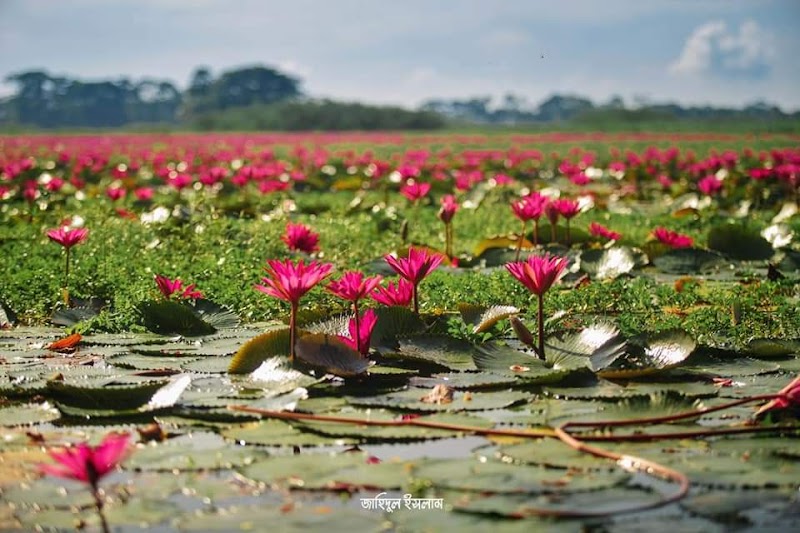
Pohela Boishakh in Dhaka bursts with color, music, and vibrant tradition marking the Bengali New Year. Dive into the city’s energetic celebrations filled with cultural performances, traditional foods, and lively street fairs, all offering visitors a practical yet thrilling experience of local life.
Arrive Early to Beat Crowds
Get to major celebration spots such as Ramna Park by 7-8 AM to find quieter areas before the full surge of visitors arrives.
Wear Comfortable, Breathable Clothing
Opt for light fabric and sturdy footwear to navigate crowded streets and cope with Dhaka’s April heat and humidity.
Stay Hydrated
Bring your own water bottle since hydration stations are limited amid large crowds during the daytime festivities.
Use Public Transport or Rickshaws
Plan for slow movement during peak celebration hours; rickshaws provide flexible local travel but be patient during heavy traffic.
Experience Pohela Boishakh: Bengali New Year Celebration in Dhaka
Every April 14th, Dhaka awakens to a vibrant pulse as Pohela Boishakh—the Bengali New Year—unfolds with unstoppable energy and color. The city streets become channels of celebration, alive with rhythmic drumbeats and the melodic strains of traditional songs, daring every visitor to join in.
From early morning, crowds gather at Ramna Park and the iconic University of Dhaka campus, where the air is dense with the scent of fresh flowers and the sweetness of seasonal delicacies. Yellow and white—colors of spring and renewal—dominate the scene, fluttering from clothes to decorations, as people trade new year greetings and share panta bhat (fermented rice), hilsa fish, and payesh (sweet rice pudding).
The festivities extend beyond the central hubs to local neighborhoods, where folk fairs light up streets with crafts, performances, and games that challenge even seasoned travelers to engage with local traditions. Roving cultural troupes fill the air, their songs and dances fiercely tied to centuries of practice. Vendors line up with vibrant attire and fresh blossoms, creating a mosaic of textures and smells that push an immersive sensory experience.
Pohela Boishakh in Dhaka isn’t merely a festival; it’s a living cultural surge that invites reflection on the past year while stepping boldly into the new one. For an adventurer, it’s a chance to witness raw human energy channeled through ritual and celebration, set against the city’s historic architecture and bustling streets.
Planning your visit means strategizing through Dhaka’s urban rhythm. The crowds surge strongest mid-morning to early afternoon; arriving early can ease navigation and offer moments to catch quieter street views. Comfortable, breathable clothing paired with sturdy footwear is essential for weaving through packed areas and uneven pavements. Hydration points are sparse, so carry water to keep pace through the moving tide.
Public transport including rickshaws offers flexible movement but be prepared for slow travel at peak times. Booking lodgings near central areas like Dhanmondi or Gulshan provides a practical base. Most events are free and open-air, so expect the sun’s assertive presence and carry sun protection.
As the day fades, the city doesn’t grow quiet but shifts to evening fairs and illuminated streets, where local food stalls tempt with unique flavors. Capture moments of traditional attire and spontaneous dance-offs in natural light, but remain aware of your surroundings.
Pohela Boishakh is about engagement—between people, tradition, and the relentless pace of Dhaka’s heart. It’s an experience to be met on its own terms: spirited, communal, and raw. Prepare well, embrace the controlled chaos, and this Bengali New Year will unfold as an unforgettable adventure.
Nearby Trips
All Adventures
Boat Charters
Water Activities
Adventures near Dhaka, Bangladesh
Discover the unique and memorable adventures that make Dhaka, Bangladesh special.
Frequently Asked Questions
What time do Pohela Boishakh celebrations usually start in Dhaka?
Festivities typically begin early in the morning around 7 AM, with major gatherings at places like Ramna Park and the University of Dhaka campus continuing through the afternoon.
Are the Pohela Boishakh events free to attend?
Yes, most outdoor events and street fairs are free and open to the public. However, some cultural performances in theaters or private venues may require tickets.
What kind of food can I expect during the Bengali New Year celebrations?
Traditional dishes like panta bhat (fermented rice), hilsa fish, sweets like payesh, and seasonal fruits are common. Street vendors and fair stalls also offer snacks and drinks reflecting Bengali flavors.
How crowded does Dhaka get during Pohela Boishakh?
Crowds can be dense especially at popular cultural hubs from mid-morning to mid-afternoon. Early arrival is advised to avoid the peak rush and enable better mobility.
Is it safe to explore the Pohela Boishakh festivities alone?
Yes, the festival is family-friendly and welcoming, but general urban safety measures apply. Stay alert in crowds, keep personal belongings secure, and plan your route in advance.
Are there any lesser-known spots to witness Pohela Boishakh celebrations in Dhaka?
Local neighborhoods around Old Dhaka host smaller, authentic events that provide intimate views of traditional music, dance, and crafts away from the bigger tourist crowds.
Recommended Gear
Lightweight, Breathable Clothing
Protects you from heat while allowing airflow during daytime street celebrations.
Comfortable Walking Shoes
Navigate uneven pavements and tightly packed crowds with ease and foot stability.
Reusable Water Bottle
Staying hydrated is critical amid heat and long hours outdoors.
Sun Protection (Hat and Sunscreen)
Shield yourself from the strong April sun during outdoor festivities.
Local Insights
Hidden Gems
- "Old Dhaka’s flower markets during morning celebrations"
- "Community art exhibits near Shankhari Bazar"
- "Riverside areas along Buriganga for sunset views post-festival"
Wildlife
- "Urban bird species like mynas and crows are very active and often join the noisy celebrations"
- "Common reptiles around green spaces such as garden lizards that dart among festival crowds"
History
"Pohela Boishakh has roots dating back over 500 years and serves as a cultural reset button, blending agrarian traditions with urban celebration, reflecting Bengali identity and resilience."
